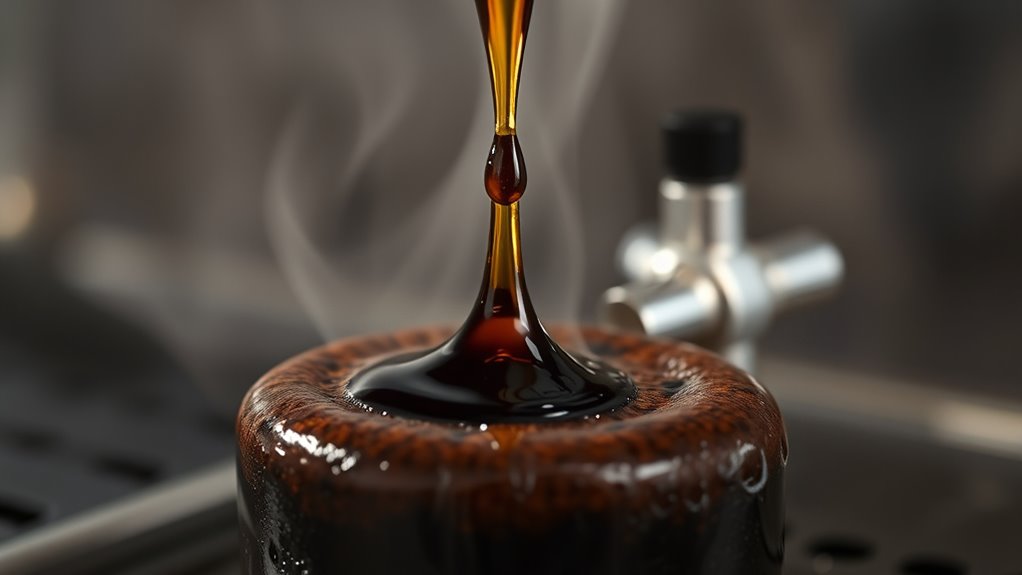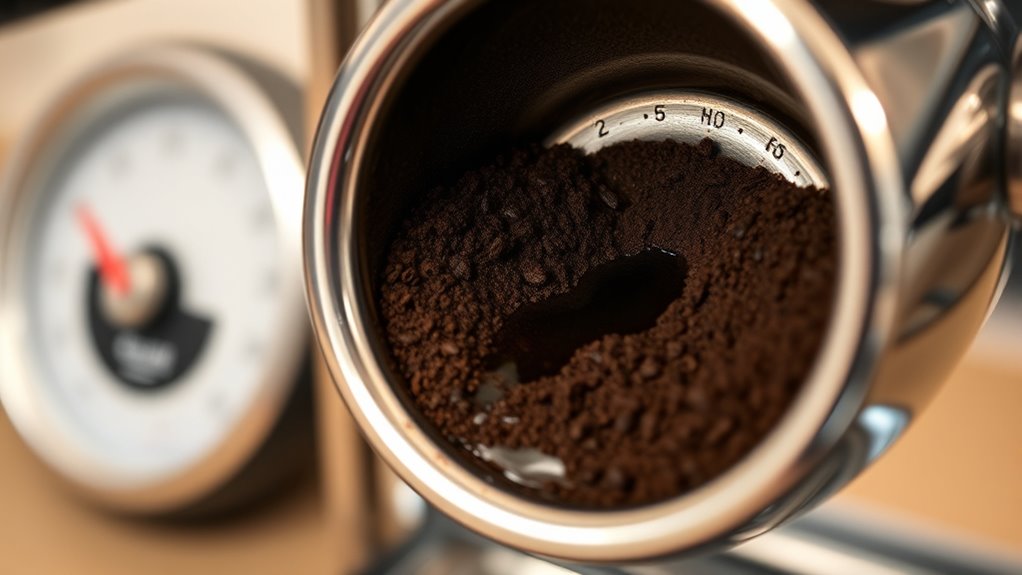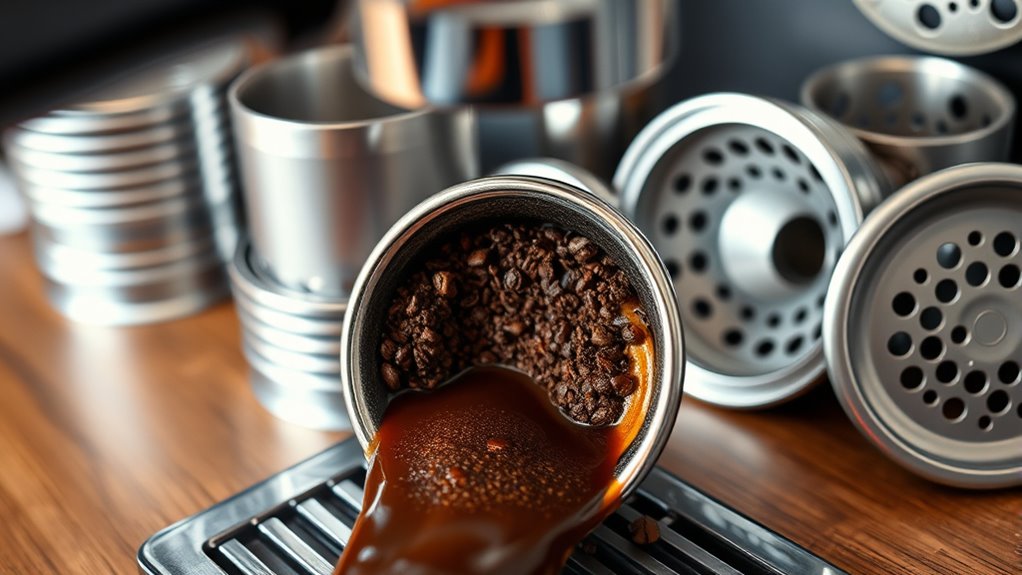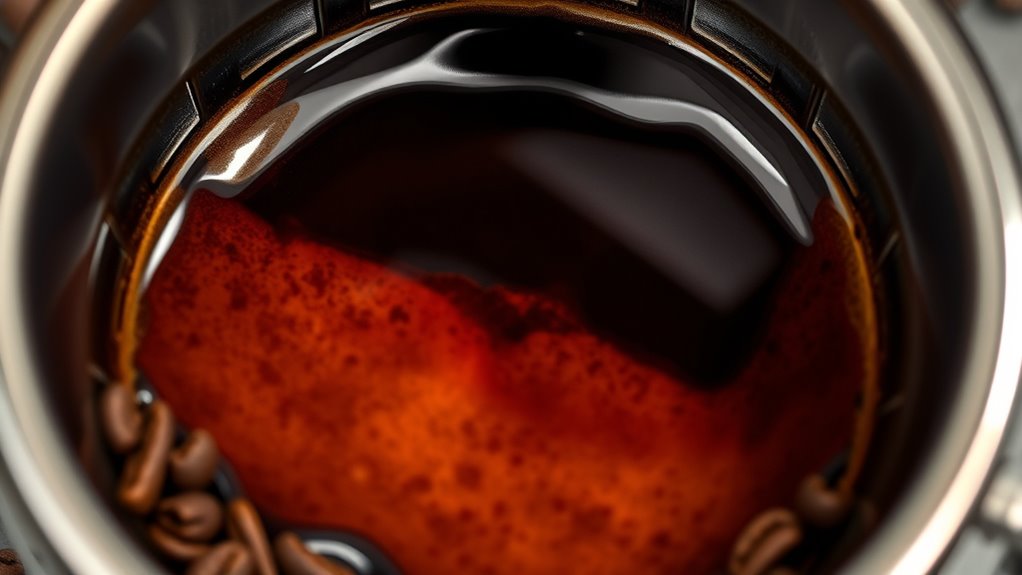If your espresso puck‘s soupy, don’t worry, it happens to the best of us! Check your grind size first—too coarse can lead to a messy puck. Also, make sure you’re dosing right; too little coffee’s a no-go. And let’s not forget tamping! A level, consistent pressure is key. Finally, your machine matters, too. Pressure fluctuations can mess with your brew. Want to fix that soupy disaster? Stick around, and let’s tackle it together!
At a Glance
- A coarse grind size can lead to a loose, soggy puck that hinders proper extraction.
- Incorrect dosing of coffee grounds may result in insufficient density, causing a soupy texture.
- Inconsistent tamping pressure can create uneven puck density, leading to channeling and poor extraction.
- Brew temperature fluctuations can negatively impact extraction, contributing to a soupy puck.
- A malfunctioning 3-way solenoid valve may not release pressure effectively, affecting puck consistency.
Understanding the Role of the 3-Way Solenoid Valve

When you’re brewing espresso, you mightn’t give much thought to the little 3-way solenoid valve, but trust me, it’s a big deal! This tiny hero controls water flow like a boss, releasing pressure right after your shot.
It prevents that messy “portafilter sneeze,” keeping your kitchen clean. Plus, it helps with extraction efficiency, so you get that perfect puck every time! Additionally, understanding how automatic espresso machines function can enhance your brewing experience.
Don’t forget about solenoid maintenance—check for leakage issues and verify installation compatibility. Different valve types can optimize your machine’s performance, making your espresso journey even more enjoyable.
The Impact of Grind Size on Puck Consistency
If you’ve ever pulled a shot of espresso and ended up with a soggy mess instead of a proud puck, you’re not alone! The grind size is essential for puck consistency. A fine, uniform grind helps water flow evenly, while inconsistent sizes lead to uneven extraction. Here’s a quick breakdown:
| Grind Size | Particle Uniformity | Puck Result |
|---|---|---|
| Coarse | Low | Soggy, loose puck |
| Medium | Moderate | Acceptable extraction |
| Fine | High | Firm, well-structured puck |
Choosing the right coffee grinder type can significantly affect your grind size and overall espresso quality.
Importance of Proper Dosing and Basket Fit

Getting the right dose and basket fit is essential for pulling a perfect shot of espresso, and trust me, it can make all the difference!
Think about it: if your dose measurement’s off, you could end up with a soupy puck or worse, a bitter cup.
Match your coffee amount to the basket compatibility—too little or too much coffee can ruin everything!
Weighing your grounds gives you consistency, helping you nail that shot every time.
So, grab your scale, find the right basket, and watch those perfect pucks transform your espresso game. Additionally, using adjustable grind settings can further enhance your espresso extraction and flavor profile.
Cheers to delicious brews and happy sipping!
Tamping Techniques for Optimal Extraction
Tamping techniques can make or break your espresso game, so let’s plunge into the nitty-gritty!
To master your tamping, focus on these key points:
Mastering your tamping is crucial; focus on consistent pressure, leveling, and pre-tamping techniques for the perfect espresso puck.
- Maintain consistent tamping pressure for uniform puck density.
- Always tamp level to avoid pesky channeling.
- Use pre-tamping distribution techniques for an even coffee bed.
- Additionally, understanding brewing technology efficiency is crucial for achieving the best extraction results.
Choosing the Right Portafilter Basket

After you’ve nailed your tamping techniques, the next big question is: how do you choose the right portafilter basket? It’s all about finding the perfect fit for your machine and preferences. Here’s a quick guide to get you started!
| Factor | Details |
|---|---|
| Basket Diameter | 58mm for commercial, 54mm for home |
| Basket Depth | 18-22g for doubles, 7-14g for singles |
| Basket Type | Non-pressurized for control, pressurized for ease |
Choosing wisely helps prevent that soupy puck! When selecting your basket, consider the ideal grind size to ensure optimal extraction. So, plunge in and discover what suits your style!
Machine Factors Influencing Puck Quality
When it comes to brewing that perfect shot of espresso, the machine you use can be a game-changer!
If your puck’s looking soupy, check these key factors:
- Brew temperature: Fluctuations can ruin your extraction.
- Pressure stability: Inconsistent pressure leads to uneven tasting shots.
- Water distribution: Make sure it’s even to avoid channeling.
Keep your machine calibrated, clean, and preheated.
Regular maintenance helps you nail that espresso every time. Additionally, choosing a machine with pressure stability can significantly enhance your brewing experience.
Remember, a little TLC for your gear goes a long way in achieving that rich, velvety puck you crave.
Happy brewing, friends!
Freshness and Roast Profile Considerations

If you’re scratching your head over why your espresso puck is looking a bit soupy, let’s explore the world of freshness and roast profiles! The roast variables you choose can make a huge difference. Lighter roasts need a bit more age to get rid of that pesky CO2, while darker ones are more forgiving. Additionally, using the finest Colombian coffee beans can enhance the flavor and extraction, leading to a better espresso experience.
| Roast Profile | Freshness Timing |
|---|---|
| Light | 3-7 days post-roast |
| Medium | 5-10 days post-roast |
| Dark | 7-14 days post-roast |
| Stale | Beyond 14 days |
| Ideal | 3-14 days |
Adjusting Operator Techniques for Better Results
You’ve got your beans fresh and your roast profile sorted, but the battle with that soupy espresso puck isn’t over yet!
To tackle this, focus on your technique by:
Master your espresso game by honing your grind size, tamping pressure, and dosing for perfect pucks every time.
- Practicing consistency in grind size; too coarse or fine can mess with your puck.
- Measuring pressure while tamping; aim for that sweet spot of 15–30 pounds.
- Keeping your dose just right; too much or too little creates chaos. Additionally, maintaining a consistent grind size is crucial for preventing bitterness and ensuring a smooth extraction.





